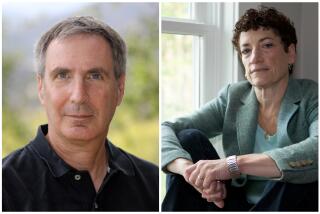Galbraith Still a Standout Among Economists : Profile: At 85, after much waxing and waning of his popularity over the decades, ‘the most famous professor at Harvard’ sees his views back in vogue.
- Share via
CAMBRIDGE, Mass. — For decades, John Kenneth Galbraith etched his opinions into the nation’s psyche as a prolific writer, as a presidential adviser and, as some colleagues call him, “the most famous professor at Harvard.”
His liberal views have not always been embraced, especially in the 1980s when the White House sought to shrink the role of government. But now, with Americans fixed on enormous issues such as health care and the economy, there are echoes of the old economist’s views in much of the discussion.
At age 85, he’s back in vogue.
“His influence has been great,” says Labor Secretary Robert B. Reich. “Ken Galbraith’s influence can be felt not only in the insistence that every American have access to high-quality health care, but also in the confidence that we as a nation can accomplish that feat.”
Even some of his adversaries acknowledge Galbraith’s ideology is holding sway these days. Says the Nobel-winning conservative economist Milton Friedman: “Galbraith is clearly in the vanguard.”
In typical fashion, Galbraith deflects such compliments with dry wit.
“I don’t accept vindication,” he said. “I just adhere to the same position year after year.”
But Galbraith too sees the pendulum swinging back in his favor, particularly in the public’s demand that the government cure the nation’s ailing health care system.
“People are seeing that some things can only be accomplished by the state, the government,” he said.
Galbraith’s basic philosophy, outlined in books such as his 1958 bestseller “The Affluent Society,” says capitalism cannot survive in a country that fails to help its needy through social programs such as housing, public schools and welfare.
To his admirers, Galbraith stands out for his ability to put a human face on economic theories. “Galbraith quite correctly understands the reason why capitalism survives is because government humanizes it,” said historian Arthur Schlesinger Jr., a longtime friend.
Schlesinger also offers another, facetious reason why the 6-foot-8 Galbraith stands out: “He’s taller than anyone else.”
But to Galbraith’s critics, his height has been matched only by his fondness of big government that intrudes on a free market economy.
“He’s not a liberal economist,” Friedman said. “He’s a socialist.”
Galbraith insists he does not take an adoring view toward government.
“I don’t see government as good or bad,” he said. “I see it as indispensable.”
“There are a great many things in this world which can only be done by government,” he added. “And therefore, it’s not a question of whether government is efficient or inefficient, it’s a question of making it better, because there’s no alternative.”
Galbraith says he did not see much of a need for government while growing up in the small town of Iona Station in Canada.
“We needed public schools and could have used a little health care, but there was a high level of self-sufficiency,” he said.
But after he graduated from the University of Toronto in 1931, Galbraith moved to the United States, where he saw a country in the throes of the Great Depression, desperately needing government help.
After completing his studies and teaching several years at Harvard and Princeton universities, Galbraith began a career in public service, becoming a price control czar under President Franklin D. Roosevelt during World War II.
Of all the public figures he has known, Galbraith said he revered Roosevelt the most.
“Most of my generation did,” he said. “We didn’t make up our minds on an issue until we knew what Roosevelt wanted.”
But the person for whom Galbraith had the greatest affection was John F. Kennedy. Galbraith was the late President’s ambassador to India.
“My recollection of him is of a charming, intelligent and extremely effective man, who had one qualification--he was always interesting,” Galbraith said.
The admiration was mutual. In his book “A Thousand Days,” Schlesinger writes how Kennedy “took pleasure in announcing that Galbraith was the best ambassador he had.” Colleagues have described how Kennedy enjoyed Galbraith’s prose so much that he would insist on seeing all his cables, regardless of whether they were directed at the President.
After Galbraith came back from India, he returned to teaching at Harvard, where he had earlier rejoined the faculty in 1948 and remained a professor of economics until his retirement in 1975.
It was in this role that Galbraith did much of his writing, gaining national acclaim. One colleague, Henry Rosovsky, has often told how he once took his car to a mechanic in New Jersey in 1966 and mentioned that he taught at Harvard.
“Ah,” the mechanic said, “do you happen to know Professor Galbraith?”
In retirement, Galbraith keeps producing bestsellers such as “The Age of Uncertainty” and “Almost Everyone’s Guide to Economics.”
All told, Galbraith has written about 30 books and is now finishing up another that will recount his personal views of economic history since World War I. And once he is done with that book, he plans to start another one, describing his encounters with famous figures such as Roosevelt, Kennedy and former French President Charles de Gaulle.
“It would be a book that would be an exercise in name-dropping,” he said.
Paul Samuelson, the Nobel-winning economist from the Massachusetts Institute of Technology and another longtime friend, said he is astounded by Galbraith’s energy.
“He’s an amazingly imaginative and creative and hard-working person,” Samuelson said. “There’s no day that goes by that he doesn’t write every morning, and it adds up to a lot.”
Galbraith, who lives a few blocks from Harvard Yard and still regularly attends events at the university, says he does not see himself kicking back and relaxing.
“I’m afraid I might not die of boredom, but I might wish that I would,” he said.
More to Read
Sign up for Essential California
The most important California stories and recommendations in your inbox every morning.
You may occasionally receive promotional content from the Los Angeles Times.













